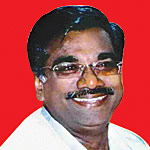There was a time when I listened to stories. There was a time when I told stories. Still I dream of stories and then write stories for publication. The published ones roll a few dollars into my coffers and I do not see any unpublished piece sleeping in my file.
There was a time when my grandpa made me live with the stories and legends he narrated, reminiscing over his childhood days when he heard those stories from his grandpa. As a dad, I told several stories to my three kids every night and lulled them into sleep. But as a grandpa I fail to attract the attention of any of my five grand kids, for each one is blessed with an Android mobile. Thanks to the digital world, they invariably say, for it does not ask questions after narrating a story, whereas I do.
The eldest of my five grandkids was once kind enough to take me on a tour into the digital world and Father Time ran very fast as if a ferocious dog was at his heels. I too bought an Android phone for myself and from that day, I found little time to do my reading or writing. The digital world was so colourful and enchanting that I discovered to my dismay that I was unable to take my eyes away from the ludicrous screen. It took time for me to understand that I was becoming an addict and it was time for me to make my great escape before the Android turns into an anaconda and digests me. Hence, I slithered my way out, but failed to pull out my grandkids from the looming anaconda.
How to pull my grandkids back to the enchanting world of stories? That became the biggest poser and I started scraping all parts of my brains for an answer. What is it that a writer like me cannot achieve? My target was after all kids and what if I kidnap all their mobiles! Ah, what an idea? I should do it when all my grandkids are out in school and hide them from their sight when they are back home. They usually pick up their mobiles, after finishing their homework and supper, during working days and rarely keep them down on holidays.
I chose a working day to kidnap the mobiles and when they returned from school, kitchen attracted them. Then they climbed up the terrace with me to water the flowering plants, and conveniently forgot all about their mobiles. I taught them to remove the weeds and told them colourful stories about each plant. They learnt from me the patience of a gardener and found delight in the garden’s colourful yield. How many parents can do this to their children, when they are busy?
Money is certainly necessary but it cannot the be-all and end-all. Yet both the parents run after money as if it is everything. I have heard many say ‘Make hay while the sun shines’. Well! The sun is bound to come in the sky everyday but sometimes it is hidden by the clouds. We can do nothing about it. But children have to be taken care of. Aren’t they the would-be pillars of the family? Who comes to their help? Only grandparents, especially when parents are making the more-than-enough dollars? But where are the grandparents? They are in Old Age Homes, looking for someone to listen to them. They are full of ideas. They are full of stories. But where are the listeners? They are with their Android phones. The only way to keep the children away is to lure them with a story. The only way to make them listen is to tell them a story, an interesting one at that.
Sultan Shahriar listened to his wife Shahrazad’s enchanting stories for about one thousand and one nights and proved to be a good person. By telling stories she turned her blue beard husband into a family man. The Canterbury Pilgrims of Geoffrey Chaucer by telling each one a story served the great purpose of saving the pilgrims from the tedium of covering a long distance on foot. In Boccaccio’s masterpiece The Decameron, a collection of one hundred tales, seven ladies and three young men, in order to take their minds away from the obsession of Black Death, each one tells a tale every day for ten days. These stories were told not only to beguile time but also to keep the very thought of Death at bay.
What Dr. Nossrat Peseschkian of Germany does today to cure his patients of their psychosomatic diseases, Antoine de la Salle of France did it five centuries ago. If you like to know the medicinal value of the stories Antoine narrated to Louis, why not dip into the enthralling book Les Cent Nouvelles Nouvelles, either in the original French or in the admirable translation in English done by Robert B.Douglas.
Such is the power of stories. They are used as tools in psychotherapy.























